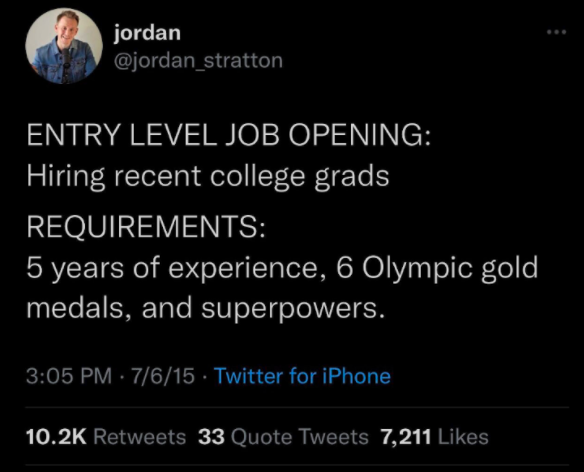What does Entry Level Mean?
Jan 31, 2022
Entry Level positions are jobs designed for recent college graduates that typically do not require prior experience.
Or at least that's what they're supposed to be.
But if you're a recent college graduate looking for your first full-time job, you know that's not the case.
In fact, it's not uncommon to see entry level positions on LinkedIn require 3+ years of experience.
College graduates are now expected to have multiple internships or professional work experience to get an entry level job. Over the last two years during the COVID - 19 pandemic it has been challenging for upcoming juniors and seniors to gain that experience.
Let's get into the details of what does entry level mean and why it matters to you.

What does entry level mean on job descriptions?
When we search for jobs using the entry level filter on LinkedIn or Indeed, hundreds of potential opportunities pop up.
Some of the entry level jobs require no experience, some require 3-5 years of experience.
Some of the entry level jobs require a college degree and some of them don't.
So… what does entry level mean, really?
Even though the years of experience and qualifications vary, the salary is typically directly correlated with the years of required experience.
Jobs that are asking for applicants with more years of experience are typically willing to pay more for that experience.
Climbing the career ladder.
If entry level is the bottom of the career ladder and requires up to five years of experience, how are we ever supposed to start?
Way Up stated in “What is an Entry Level Job” that many entry level positions require no experience at all, so those with a degree are overlooked.
Those with degrees are expected to have the three years of experience needed for a higher position. “Although they may be labeled “entry-level,” they would be better defined as entry- to mid-level jobs, since they expect you to have 1-3 years of full-time, professional experience.”
Way Up clarifies that the smaller companies are the ones who list jobs as entry level, but want more years of experience.
Even if you don't meet the listed required experience on jobs, that doesn't mean you're not the best fit for the role. It's not uncommon for under-qualified applicants to come out on top.

What does entry level mean and why do they want so much experience?
The big question is…what do you do when a job requires two or more years of experience, and you don't have that?
We need experience to get a job, but we need a job to get experience. At Sky Society, we call that the experience paradox and our accelerator was built to solve that for women looking to start careers in marketing.
Did the chicken or the egg come first? Did the job or experience come first? Everybody seems to disagree on the right answer.
For many companies, keeping the role entry level is a way to pay less for more experience.
The Muse has an answer in their “What to do when an Entry - Level Job Requires “Two Years of Experience”. Most of the time the job description is the hiring manager’s wish list of what they are looking for in a potential candidate. It doesn't mean they won't make exceptions for candidates with less experience.
So even if you don't meet the requirements for an entry level job, don't let that deter you from applyin!
We're still searching for our answer.
The truth is that every company and hiring manager defines entry level differently. All you need to do is keep applying to jobs that may not feel fully qualified because job descriptions are often wish lists, not strict requirements.
There are some positions that will hire you with no experience and will train to your full potential.
What does college teach you?
College gives you the credentials, not the experience. We're falsely told that a degree is all we need to enter the job market, but that's not true anymore.
Experience matters more and entry level jobs are demanding it.

Conclusion
There is no definitive answer as to the question, what does entry level mean?
All entry level jobs is a starting point. It's where most job-seekers enter the job market and typically requires less experience and education.
While the job requirements may vary, all employers are looking to take a chance on someone they see potential in and that someone can very well be you. You just have to apply and not be deterred by being under-qualified.
All it takes is for one company to say yes. From personal experience once you get one yes to a job many others will quickly follow.
Yes, the rejections are hard and it takes a toll, but… do not give up!
Written by Gabrielle Sayer
Join 10K Women in Marketing
Women in Marketing LinkedIn Group
A private community where young women in marketing network, collaborate, and support each other.
GOOD STUFF ONLY
The Sky Society Weekly Edit
Signup for our weekly newsletter for:
✨ New entry-level marketing jobs
✨ Marketing tips and tea
✨ Resume and portfolio resources
✨ Invites to exclusive events
We hate SPAM. We will never sell your information, for any reason.









